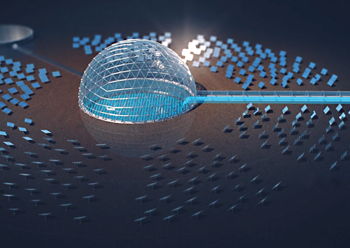Neom desal unit to debut ‘solar dome’ technology
01 February 2020
Saudi Arabia’s $500-billion city Neom has signed an agreement with the UK-based Solar Water Limited for the construction of the first desalination plant with ‘Solar Dome’ technology in the futuristic new city.
The pilot project promises to revolutionise the water desalination process, helping solve one of the world’s most pressing problems – access to fresh water, said Neom.
Work on the first “solar dome” will begin this month (February) and is expected to be completed by the end of 2020, according to Neom.
At an estimated $0.34/cu m, the cost of producing water via “solar dome” technology will be significantly lower than desalination plants using reverse osmosis methods, it stated.
The technology will also significantly reduce the impact on the environment by producing more concentrated brine, a potentially harmful byproduct of the water extraction process, it added.
Saudi Minister of Environment, Water and Agriculture Abdulrahman Al Fadli said: “Neom’s adoption of this pilot supports Saudi Arabia’s sustainability goals, as outlined in the country’s National Water Strategy 2030, and is fully aligned with the sustainable development goals set out by the United Nations.”
Commenting on the project, CEO Nadhmi Al Nasr said easy access to abundant seawater and fully renewable energy resources means Neom is perfectly placed to produce low-cost, sustainable fresh water through solar desalination.
Solar Water’s ground-breaking approach, developed at the UK’s Cranfield University, represents the first use on a large scale of concentrating solar power (CSP) technology in seawater desalination.
The process sees seawater pumped into a hydrological “solar dome” made from glass and steel, before it is superheated, evaporated and eventually precipitated as fresh water, explained Al Nasr.
The “solar dome” desalination process, which can also operate at night due to the stored solar energy generated throughout the day, will reduce the total amount of brine that is created during the water extraction process. The solar dome process helps prevent any damage to marine life as no brine is discharged into the sea, said the top official.
- Samsung wins $1.85bn Aramco EPC contract
- Apicorp, YDE sign solar, energy savings pacts
- EOIs invited for three major ISTPs
- Elkon concrete plants for housing project
- Neom desal unit to debut ‘solar dome’ technology
- NREP invites bidders for four solar projects
- Veolia breaks ground on waste-to-energy plant



